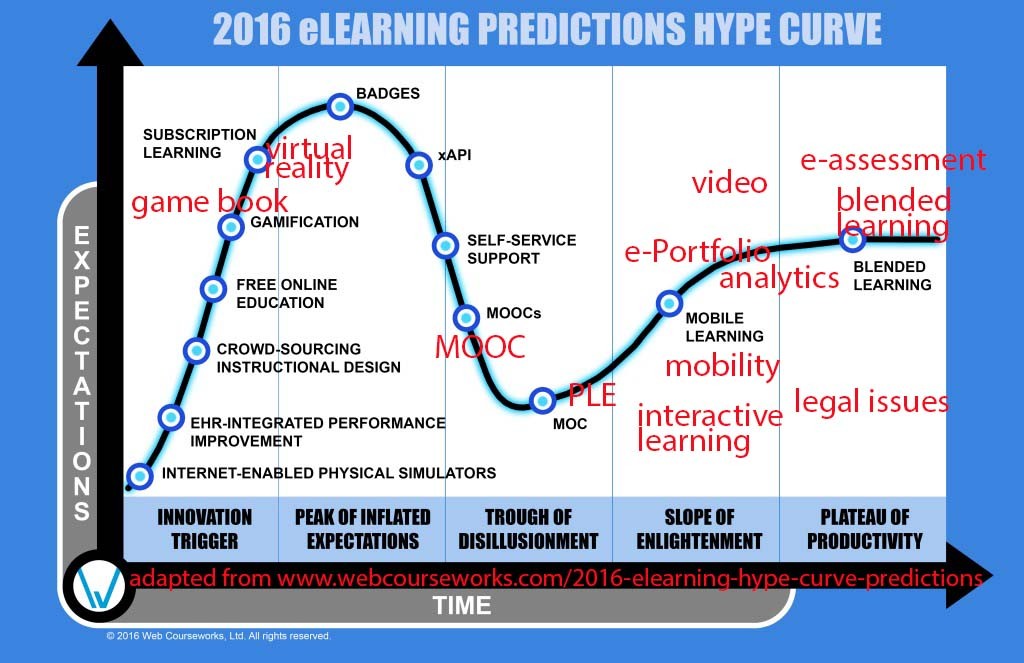2016 eduhub days feedback
The 2016 eduhub-days edition in Fribourg kept with its tradition of being a successful event wherein e-learning aficionados/aficionadas meet to share common issues and best practices in HEI teaching and learning. Once again a wide diversity of technologies was discussed within small groups (cafés and showroom sessions). Besides the plenary session whose focus was learning analytics of MOOCs, I personally could learn about the following topics:
Virtual reality : 3 types of goggles could be tested, from the most sophisticated to the cheap Google Cardboard version on which a smartphone can be installed. While hardware does not seem to be anymore of an issue (thanks to smartphones), software for designing “useful” learning apps is still lagging behind.
eXperience API: In the technology landscape, xAPI imposes itself to extend LMS functionalities without having to modify the software. More flexible than SCORM, xAPI allows to collect activities persistently (based on a unique user id), grading, time stamping, interactive content, etc. It is thus a promising technology to create flexible learning ecosystems.
Learner’s workbench: Considering the scenario wherein students read books, look up Wikipedia, watch youTube videos, take notes, and finally prepare index cards for reviewing content, naturally leads to the Learner’s workbench concept. This is PLE in literal sense: no lesson planning, no teaching material production, no official distribution channels or publishing platforms, but a whole ecosystem in which students immerse themselves everyday to perform learning activities such as comment, search, compare, answer questions, explain, reconstruct, memorize, summarize, condense, repeat, and revisit problems. Given such a Learner’s workbench evolves continuously with new technologies, it seems unrealistic to design it; rather institutions should look at ways to make it part of the learning/teaching ecosystem.
e-something: an e-education portal for sharing content (reminiscent of SWITCHcollection – which has been discontinued because of lack of interest by the users) has been presented by the UNIBAS, the principle being to interconnect different sources of information, including Swissbib, based on Dublin Core to describe content with metadata; e-portfolio, maintained by students to be used as a learning diary or career tool (life long learning), with the new Swiss edu id to keep it on the long term; eSkript interactive lecture, a tool for producing (interactive) books with the possibility of collaborating with other students and annotating beside reading; e-assessment with the Safe Exam Browser (SEB) which becomes each year more sophisticated with new quiz modules, integration more secure with LMS systems, and new BYOD features such as touch optimized mode for windows tablets, buttons for restart exam, reload page, change keyboard layout, current time displayed (in case smart watches are forbidden), disabled spell check, text zoom, etc.
Flipped class-rooms: at the HES-SO MSc in Nursing Sciences, blended learning at program level has been pilot since autumn 2013. Six different scenarios corresponding to distinct courses for nurses have been presented and demonstrate how hybrid teaching can be varied and better adapted to learners’ needs.
Swiss edu id: The next generation of the Swiss AAI login system. Not being linked to a single institution and limited in time, a recent survey targeting Swiss HEI revealed how such a login system could be useful for alumni (LLL) to further benefit from the following services:
- Access to learning material
- Data storage and sharing
- Library access
- Network access, VPN
- Software with discount
- Contact with university-peer, job platform
To summarize, and to the exception of game tools and virtual reality, all presented topics at this 2016 eduhub days edition lay on the slope of enlightenment and plateau of productivity on the famous Gartner’s hype curve (see Figure, with eduhub days topics in red). This observation is in line with the fact that eduhub members have to provide well-tried working services targeting large academic communities. However, such kind of services seem to not always match with some criteria stressed by the student panel in which we could hear that user experience (UX), creativity and collaborative tools are mostly lacking in the HEI teaching environments. More work remains to do then and certainly we all look forward for the next eduhub days editions to fill the gap.

